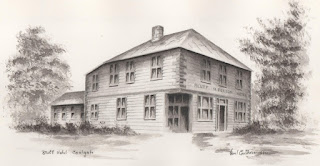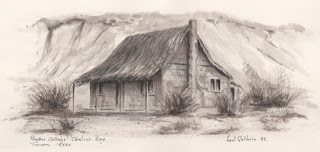The Pub at Coalgate
 |
|
I imagine this old pub at Coalgate would have had a few tales to
tell in its day. I’m told the village of Coalgate derived its name from the very
coal extracted from within the area. It is also said, the village sat at the entrance to the valley where
coal was mined, a few kilometer's to the west and as I understand, the village
was regarded as the gateway to those coalfields, hence the name. When a census of New
Zealand was carried out around the turn of
the century, James Henry Potton was the proprietor of the Coalgate local, known
as the Bluff Hotel. However, it had previously been built by Mark Scott around 1876, who
ran the hotel for several years, before selling out and moving to Rangiora. Several tried their hand behind the bar at this pub before it came
into the hands of James Potton in 1896. He
had previously travelled from England
during the 1850s to Christchurch, where he began
his New Zealand
career in the coach building trade as an apprentice. James is said to have increased the quality of hotel service to the
general public, as well he promoted the area’s sporting potential to the
shooters and anglers alike. They came in
their numbers, trying their luck at angling for trout in the upper reaches of
the Selwyn River, while shooting parties are said
to have been provided with an abundance of rabbits and other game along the
river flats. Located within a few chain of the Coalgate Railway Station, along
the branch line to Whitecliffs, not far the Hororata, and Glentunnel
highway. The hotel, during that horse and cart era, was accompanied by large
stables and shelter for numerous vehicles. Constructed on almost a hectare of land, this architecturally
designed hotel was built with twenty rooms including one large commercial
room. I loved the description of the
three sitting-rooms and I quote; ‘where
absolute quietude could be enjoyed’!
So popular did this hotel become, the two storied building was forced to
expand by adding extra rooms for guests. I read some reminiscing of Betty Yeoman, a former resident had written
a few years ago. She described Dick
Wills the blacksmith at Coalgate and Mrs Wills, who took in boarders. Mrs Wills, she recalled had a gramophone and
used to tell Betty, who was only a little girl at the time; “there was a little
man inside the gramophone making it go.” “I often used to wonder.” She
said, “how that little man ever fitted inside the box?” Betty told of her Auntie Annie, who worked at the Bluff Hotel when
she was young and of the Pianola standing it the sitting room. Many of the girls used to sit and play the limited
quantity of tunes on the instrument for hours on end. She also told of her Aunt Nell skating on the
lake at Homebush, and of when the ice gave way sending Nell into the freezing
water below.
There was Mr McCaughan the proprietor of the Bluff Hotel, Betty
recalled, how he would take many of the men home to their wives before their
money ran out at the bar. Then of course there were the swaggers who frequented Coalgate, one
in particular Betty Yeoman could recall, was John the Baptist. When passing through he used to sleep in the
Homebush woolshed. However she does
recollect John used to like swimming in the river. One day her Aunt Nell found an old rag, as
she thought, hanging on the fence. Nell
burned the rag under the copper. The
next day John the Baptist came around looking for his bathing costume. Guess what Auntie Nell put in that fire? Trevor Charles of Coalgate wrote in 1988. ‘My time at Coalgate has been a long and
happy association, there have been many episodes during my life some sad and
some exciting. Trevor could well have
been describing any of our rural settlements when he continued. ‘Now in Coalgate we have no police station,
no railway, store, post office, coal mines or transport yards and at my age I
know where my next move will be, just up the road to the Malvern cemetery’.
While some of Coalgate’s history may be buried beneath the dust of
time, its memory will linger on. Hopefully my sketch of the old Bluff Hotel,
which was destroyed by fire in 1968, will rekindle a recollection of those who
have passed this way before.



Comments
Post a Comment